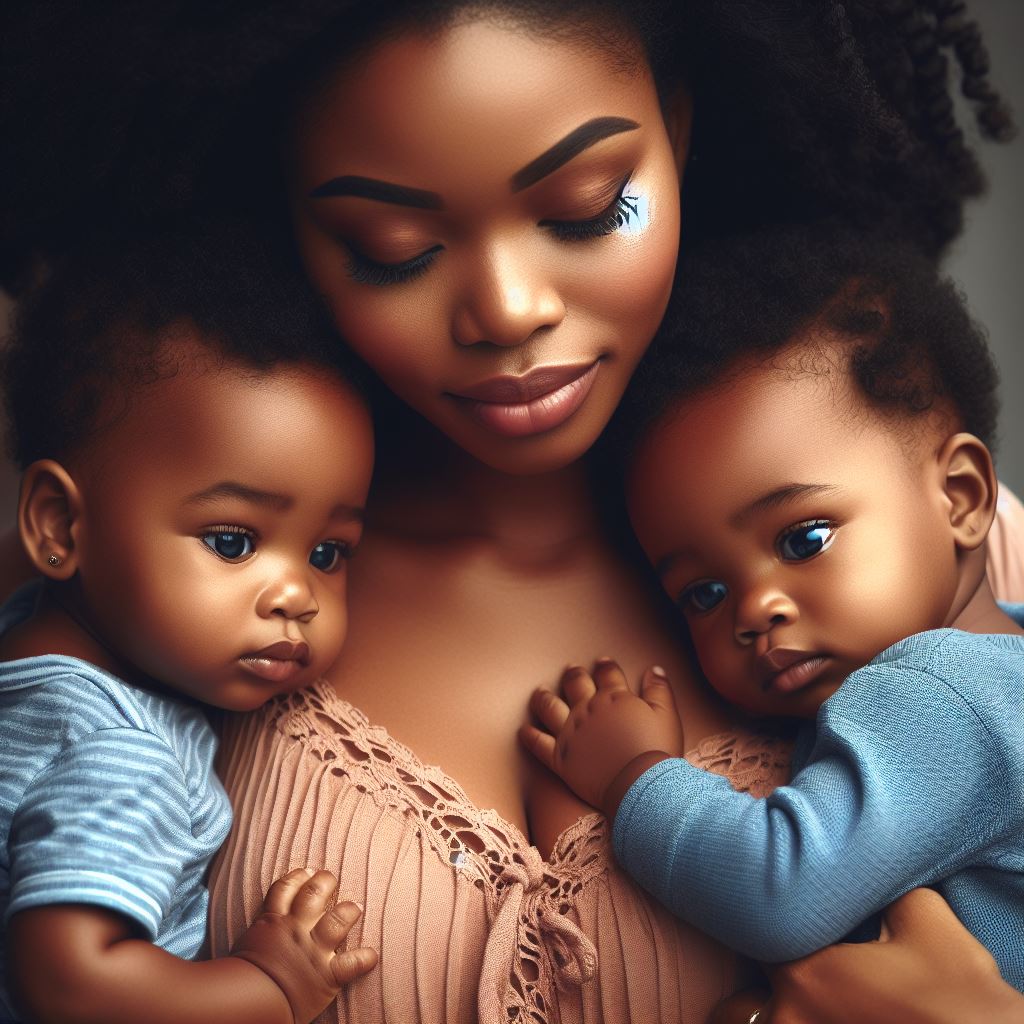Introduction
Nigerian Traditions in Raising Twins: Nigeria, a country rich in traditions, holds a significant cultural value for the birth of twins.
Twins are seen as a special blessing and are highly esteemed in Nigerian culture.
According to Nigerian traditions, it is believed that twins have supernatural powers and bring good fortune to their families.
Nigerian culture views twins as a divine phenomenon, attributing a direct spiritual connection to the twins.
They are considered unique and are given special attention and care.
Nigerian parents believe that twins possess extraordinary abilities, such as the power to predict the future and the ability to communicate with spirits.
The arrival of twins in a Nigerian family is celebrated with great joy and enthusiasm.
A ceremony known as “Ibeji” is performed to honor the twins and seek protection for them.
The celebration involves special rituals, prayers, and offerings to the deities, as well as feasting and dancing in their honor.
In Nigerian communities, twins are often given special names to reflect their unique status.
The Yoruba tribe, for example, names their twins Taiwo and Kehinde, which mean “taste the world” and “second to arrive” respectively.
These names hold deep cultural significance and serve as a reminder of the twins’ sacredness.
Furthermore, Nigerian traditions emphasize the close bond between twins.
Twins are expected to support and protect each other throughout their lives.
They are encouraged to develop a strong sense of unity, cooperation, and mutual respect.
Parenting Made Just for You
Get personalized Parenting Solutions tailored to your child’s needs. Transform your parenting journey with expert guidance in 1-3 days.
Get StartedIn fact, Nigerian traditions place immense value on the birth of twins.
Twins are seen as special beings with extraordinary powers, and their arrival is celebrated and cherished.
The significance of twins stretches far beyond their biological bond, serving as a symbol of spiritual connection and unity within Nigerian culture.
Beliefs and Superstitions Surrounding Twins
Twins as a blessing or a curse?
In Nigerian culture, twins hold a prominent place, surrounded by numerous beliefs and superstitions.
Their classification as a blessing or curse hinges on multiple factors.
Twins are often seen as a dual blessing, bringing double joy and happiness to their families.
They are seen as a special gift from the gods, a sign of fertility and prosperity.
However, there are also instances where twins are viewed with skepticism and fear, considered a curse.
One common belief associated with twins is their supernatural powers.
It is believed that twins have the ability to communicate with each other telepathically.
They share a unique bond, understanding each other’s thoughts and feelings without speaking—a connection that is said to be unparalleled.
This belief has led to the perception that twins possess heightened intuitive abilities and an extraordinary connection.
Common superstitions and beliefs associated with twins:
Twins possess spiritual protection alongside their supernatural powers, believed to safeguard them from various forces.
It is believed that twins possess a special aura that guards them against evil spirits and misfortune.
Unveil the Perfect Name that Tells Your Family's Story
Let us help you find a name that embodies your family's values, traditions, and dreams. Our personalized consultation weaves cultural insights to create a name that's uniquely yours.
Get StartedFamilies often seek their blessings and protection for the entire household, considering them as spiritual guardians.
Another fascinating belief surrounding twins is the concept of reincarnation.
In Nigerian traditions, some believe that twins are the reincarnation of ancestral spirits, deities, or even extraordinary beings.
This notion elevates their status and leads to the belief that twins hold ancient wisdom and possess a divine purpose.
These superstitions and beliefs surrounding twins contribute to the unique and revered status they hold in Nigerian society.
The duality of their perception, being both a blessing and a potential curse, adds depth to the cultural significance of twins.
Families celebrate their arrival with joy and anticipation, while also embracing the responsibilities, challenges, and spiritual connection associated with raising twins.
These beliefs frequently influence how families and communities treat twins.
They receive special attention, care, and respect, as people believe they possess supernatural abilities and a unique connection to the spiritual realm.
Twins evoke admiration, symbolizing luck and divine protection, captivating others with their fortunate presence.
In short, Nigerian traditions surrounding twins are rich with beliefs and superstitions.
Twins bless and potentially curse with supernatural powers, spiritual protection, and perceived reincarnated spirits.
Their presence in Nigerian culture reinforces the significance of twins and the unique role they play in the community, making them revered and celebrated beings.
Read: Twin Clothing: Budget-Friendly Strategies
Naming Traditions and Customs
Importance of names in Nigerian culture
In Nigerian culture, names bear immense significance, transcending mere labels, portraying a deeper cultural value beyond their surface meaning.
They are believed to shape a person’s destiny and can reflect the family’s values and beliefs.
Naming ceremonies for twins
In Nigerian tradition, the birth of twins is considered a special event.
As a result, naming ceremonies for twins are elaborate and filled with meaningful rituals and customs.
Special rituals and preparations
Before the naming ceremony, the family prepares by decorating the house and cooking traditional dishes.
They want everything to be perfect for this joyous occasion.
Naming patterns based on gender or birth order
In Nigerian culture, the names given to twins often follow a specific pattern based on the gender of the babies or their birth order.
Taiwo, the first-born twin among the Yoruba, tastes the world. Kehinde, the second-born, comes after, as tradition dictates.
Chukwuma, meaning “God knows best,” is given to the first-born male twin among the Igbo people.
Chukwuemeka, the second-born male twin, bears the name “God has done great things” for him.
Igbo culture names the first-born female twin Ifeoma, signifying “good thing,” and the second-born Nneoma, expressing “motherhood is good.”
These naming patterns not only differentiate between the twins but also carry cultural and religious significance.
Read: Twin Bonding: Fostering Unique Connections

Traditional Practices in Childcare: Nurturing Twins the Nigerian Way
In Nigeria, the birth of twins is not merely a biological event but a cultural phenomenon deeply rooted in tradition.
In the realm of childcare, we see traditions actively shaping how vibrant nations raise twins, going beyond mere rituals.
Cultural importance of extended family support
Nigerian families forge tight bonds, emphasizing communal spirit while raising twins in the spotlight of their close-knit connections.
The extended family plays a pivotal role in childcare, offering a network of support that goes beyond the nuclear family.
Grandparents, aunts, uncles, and cousins actively participate in the upbringing, creating a rich tapestry of shared responsibilities and experiences.
The presence of the extended family is particularly crucial during the early years of a twin’s life, providing a safety net for parents and fostering a sense of belonging for the children.
This collective approach not only eases the burden on individual parents but also ensures that twins grow up surrounded by a diverse array of familial love and guidance.
Co-sleeping and shared breastfeeding
Nigerian traditions emphasize the significance of close physical contact in the early stages of a child’s life, and this holds especially true for twins.
Co-sleeping, where infants share the bed with their parents, is a common practice that transcends the realm of mere convenience.
Benefits of close physical contact
The benefits of co-sleeping extend beyond convenience, as it fosters a deep emotional connection between parents and twins.
The physical proximity ensures that infants feel secure, and studies suggest that it may contribute to better sleep patterns and emotional development.
Role of breastfeeding in fostering bond between twins
Breastfeeding takes on a central role in nurturing twins in Nigeria.
Breastfeeding fosters a sacred bond beyond nutritional benefits, as it involves a cherished, active bonding ritual.
Mothers often breastfeed both twins simultaneously, creating an intimate moment that solidifies the familial bond.
This practice not only establishes a physical closeness but also reinforces the emotional connection between mother and twins.
In the intricate web of Nigerian traditions, the upbringing of twins is a collaborative effort that weaves together cultural values, extended family support, and intimate caregiving practices.
Through these time-honored customs, the journey of raising twins becomes a celebration of unity, love, and the rich tapestry of Nigerian heritage.
Read: Essential Baby Gear for Nigerian Newborns
Celebrations and Festivals: Embracing Twinhood in Nigerian Traditions
Twin Festivals in Nigeria
Ibeji Festival in Yoruba Culture
In the vibrant tapestry of Nigerian traditions, the Yoruba people hold a special place for twins.
The Ibeji Festival, celebrated predominantly by the Yoruba community, is a joyous occasion that pays homage to the birth of twins.
The Yoruba consider twins, called “èjìrè” or “èjìrè-òkè,” sacred gifts from the Orisha, the deities in their religion.
Annually, the Ibeji Festival pulsates with lively music, dance, and rituals, actively ensuring the well-being and prosperity of twins.
Nguójà Festival in Igbo Culture
In Igbo culture, the Nguójà Festival is a celebration that resonates with the spirit of unity and shared blessings.
The Igbo people recognize the uniqueness of twins and honor their birth through this vibrant festival.
Nguójà is a time for families to come together, express gratitude for the gift of twins, and seek the protection of ancestral spirits for the twins’ journey ahead.
Drumbeats echo through the air as traditional Igbo dances take center stage, weaving a cultural tapestry that binds the community in celebration.
Significance of These Celebrations for the Twins and Their Families
These twin festivals hold profound cultural and spiritual importance, transcending mere revelry with their deep-rooted significance.
The twins enter a world that celebrates and reveres their presence, marking the beginning of joyous celebrations.
The festivals are a communal acknowledgment of the unique journey twins undertake in life, and they foster a sense of identity and belonging.
For families, these festivals are a testament to the interconnectedness of the community.
They serve as occasions for gratitude, reinforcing the belief that twins bring double blessings and joy.
These celebrations perform rituals to invoke ancestral spirits, ensuring the twins’ protection and a harmonious, prosperous life.
In the intricate tapestry of Nigerian traditions, the celebrations of Ibeji and Nguójà festivals stand as vibrant threads, weaving a narrative that honors the sacredness of twinhood and strengthens the bonds of community and family.
Read: Twin Sleep Schedules: Mastering the Routine
Challenges Faced by Nigerian Parents of Twins
Having twins is a unique and exhilarating experience, but it also brings its fair share of challenges for Nigerian parents.
Economic factors and societal misconceptions pose challenges, dividing them into two categories: economic considerations and social stigmas.
Economic considerations
Cost of raising twins
Raising one child is expensive enough, but raising two at the same time can significantly increase the financial burden on parents.
From pregnancy and childbirth expenses to providing for their basic needs, the cost of raising twins can be overwhelming.
Parents have to consider expenses like diapers, formula, clothing, and education for both children simultaneously.
Financial strain on parents
With the increased expenses related to raising twins, parents often face financial strain.
Many Nigerian parents find it challenging to meet the financial demands of raising two children at once.
They may struggle to provide their twins with the same opportunities and resources as they would if they had only one child.
Social stigmas and misconceptions
Attitudes towards twin families
In Nigerian society, there are various attitudes towards twin families.
While some people celebrate and view twins as a blessing, others may hold negative beliefs or superstitions.
This can lead to challenges in social acceptance and support for parents of twins.
Stereotypes and discrimination
Twin families may also face stereotypes and discrimination.
They might be subjected to assumptions that twins are “difficult” or “unlucky.”
Some people may view them as a burden or believe in unfounded superstitions associated with twins.
These misconceptions can lead to exclusion, judgement, or even mistreatment.
As Nigerian parents raise their twins, they strive to overcome these challenges for the well-being of their children and their own peace of mind.
It is important to recognize the difficulties they face and offer support and respect to twin families.
Conclusion
In Nigerian culture, traditions play a vital role in raising twins.
The belief system deeply roots practices from naming ceremonies to using traditional herbs for health.
The gods’ special gift is considered twins, blessings that customs and rituals protect and ensure their well-being.
Through these traditions, parents not only celebrate the uniqueness of their twin children but also seek guidance and blessings from their ancestors and deities.
As Nigeria becomes more modernized, it is crucial to preserve and embrace these cultural practices for future generations.
These traditions are not only a celebration of identity and heritage but also serve as a way to strengthen the bond within families and communities.
By passing down these customs, children are taught the importance of their cultural heritage and are instilled with a sense of pride and belonging.
Additionally, these practices contribute to the rich tapestry of Nigerian society, making it more diverse and culturally vibrant.
Embracing and preserving these traditions ensures the Nigerian way of raising twins thrives, cherished for generations.




